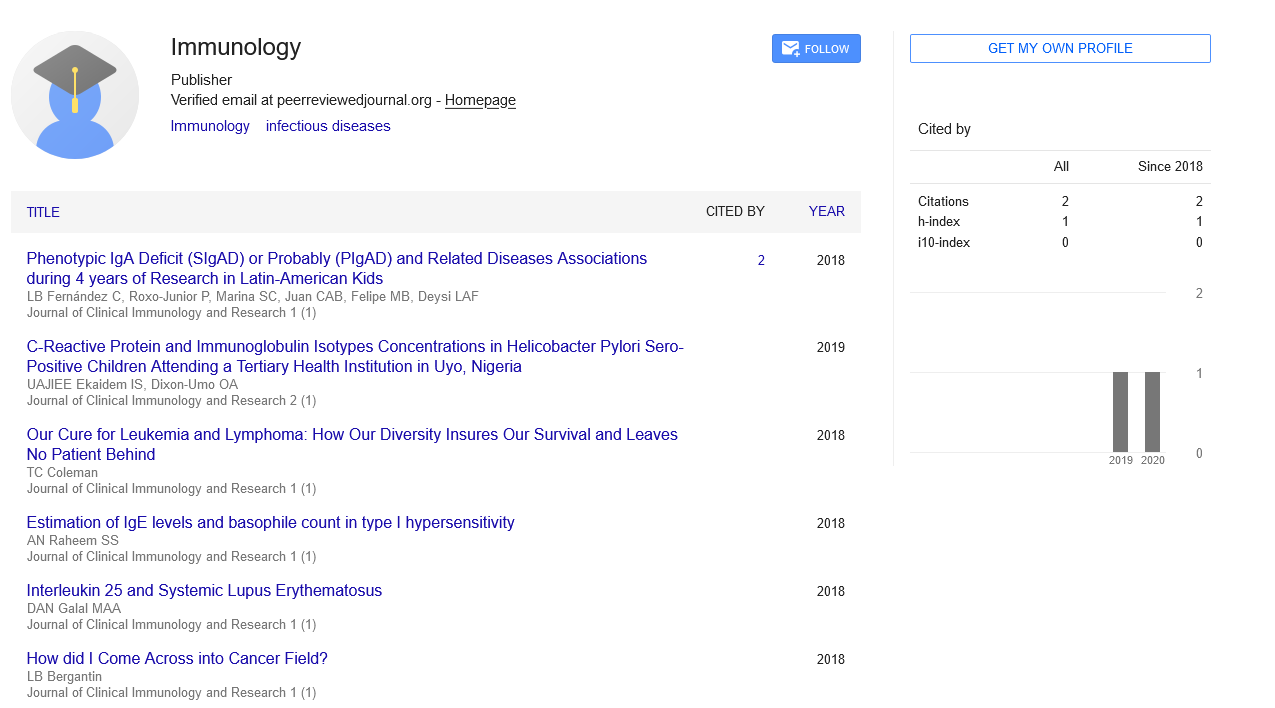Perspective, J Clin Immunol Res Vol: 6 Issue: 2
Immunogenicity: Immune System's Response to Foreign Substances
Jia Xeng*
1School of Public Health, Nanjing Medical University, Nanjing, China
*Corresponding Author: Jia Xeng,
School of Public Health, Nanjing Medical
University, Nanjing, China
E-mail: xengjia@gmail.com
Received date: 15 May, 2023, Manuscript No. JCIR-23-104724;
Editor assigned date: 17 May, 2023, PreQC No JCIR-23-104724 (PQ);
Reviewed date: 01 June, 2023, QC No JCIR-23-104724;
Revised date: 08 June, 2023, Manuscript No JCIR-23-104724 (R);
Published date: 16 June, 2023, DOI: 10.4172/JCIR.100081
Citation: Xeng J (2023) Immunogenicity: Immune System's Response to Foreign Substances. J Clin Immunol Res 6:2.
Abstract
Description
The immune system is a complex and sophisticated defense mechanism that protects our bodies from harmful pathogens and foreign substances. When the immune system encounters a foreign substance, such as a vaccine, a therapeutic protein, or a transplanted organ, it initiates an immune response. Immunogenicity refers to the ability of a substance to provoke an immune response.
Understanding immunogenicity
Immunogenicity is the process by which the immune system recognizes and responds to foreign substances, known as antigens. Antigens can be proteins, peptides, carbohydrates, or nucleic acids present on the surface of pathogens or introduced into the body through medical interventions. When an antigen is recognized as foreign, immune cells, such as B cells and T cells, are activated, leading to the production of antibodies and the generation of an immune response.
Immunogenicity is the process by which the immune system recognizes and responds to foreign substances, known as antigens. Antigens can be proteins, peptides, carbohydrates, or nucleic acids present on the surface of pathogens or introduced into the body through medical interventions. When an antigen is recognized as foreign, immune cells, such as B cells and T cells, are activated, leading to the production of antibodies and the generation of an immune response.
Several factors contribute to the immunogenicity of a substance. These include the nature of the antigen, its structural characteristics, the route of administration, the dose, the presence of adjuvants, and the genetic background of the individual. Antigens with complex structures or those that closely resemble self-antigens are more likely to trigger an immune response. The route of administration also influences immunogenicity, with certain routes, such as intramuscular or subcutaneous injection, being more effective in stimulating an immune response than others.
Adjuvants are substances added to vaccines or therapeutic proteins to enhance immunogenicity. They help to amplify the immune response by activating antigen-presenting cells and promoting a robust immune reaction. Additionally, individual genetic factors, such as the Major Histocompatibility Complex (MHC) genes, can influence an individual's ability to mount an immune response to a specific antigen.
Immunogenicity in vaccine development
Immunogenicity plays an important role in the development of vaccines. Vaccines are designed to stimulate a protective immune response against specific pathogens. The immunogenicity of a vaccine depends on factors such as the choice of antigens, the formulation, the delivery system, and the presence of adjuvants. Vaccines aim to elicit the production of neutralizing antibodies and the generation of memory B cells and T cells, providing long-term protection against infections.
Immunogenicity in biologics and therapeutic proteins
Biologics, including therapeutic proteins and monoclonal antibodies, have revolutionized medical treatments for various diseases. Immunogenicity is a major consideration in the development and use of these therapeutic interventions. The immune system can recognize these foreign proteins as antigens and generate an immune response against them. In some cases, this immune response can lead to the formation of anti-drug antibodies, which may impact the safety and efficacy of the therapeutic intervention.
Assessing and mitigating immunogenicity
Assessing the immunogenicity of a substance is an essential step in medical interventions. Immunogenicity assays, including measuring antibody titers or evaluating cellular immune responses, are conducted to determine the potential immune response elicited by a substance. Additionally, strategies to mitigate immunogenicity, such as modifying the structure of the antigen, optimizing the formulation, or using immune-modulating agents, are employed to minimize unwanted immune reactions and enhance the safety and efficacy of medical interventions.
Conclusion
Immunogenicity is a fundamental aspect of the immune system's response to foreign substances. Understanding the mechanisms and factors influencing immunogenicity is important in the development and use of vaccines, biologics, and other therapeutic interventions. By harnessing the knowledge of immunogenicity, researchers and healthcare professionals can design interventions that elicit the desired immune response, while minimizing adverse reactions. Continued research in immunogenicity will lead to advancements in medical interventions, ensuring their safety, efficacy, and potential for improving human health.
 Spanish
Spanish  Chinese
Chinese  Russian
Russian  German
German  French
French  Japanese
Japanese  Portuguese
Portuguese  Hindi
Hindi 